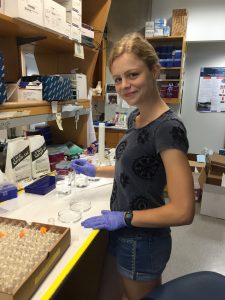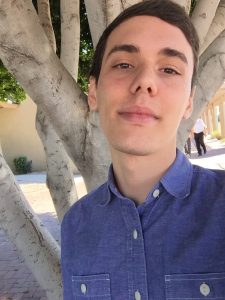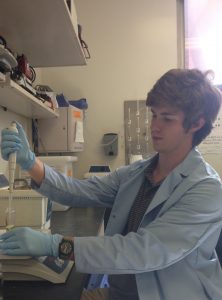Graduate Students and Post-Doctoral Research Associates
The Duke University Superfund Research Center’s training emphasis is on graduate students and post-doctoral research associates who are associated with our various projects and support cores. If you are interested in graduate or post-doctoral work with one of our projects, please contact the appropriate Investigators.
There is a strong link between the Duke SRC and the University Program in Environmental Health, an NIH-supported program for graduate students. The majority of Superfund trainees are also involved in UPEH activities.
Are you a current Duke SRP Center trainee looking for training opportunities in research translation and community engagement? Check out the calendar below for upcoming activities.
[googleapps domain=”calendar” dir=”calendar/embed” query=”title=RT%20and%20CE%20Training%20Opportunities%20for%20Duke%20SRC%20Trainees&height=600&wkst=1&bgcolor=%23FFFFFF&src=j6q07po0m3gm85rjneq81g4om8%40group.calendar.google.com&color=%23B1440E&ctz=America%2FNew_York” width=”800″ height=”600″ /]
Internships
The Duke University Superfund Research Center is seeking interns for Summer 2018!
Positions are open to students currently enrolled in a four year postsecondary institution either as an undergraduate or master’s student. All summer trainees will be paid a competitive hourly wage and are expected to work full-time and participate in training for a maximum of 35 hours per week (start and end dates are flexible between mid-May through mid-August).
Student research will be focused on one of the below SRC projects/cores:
- Cholinergic and Monoaminergic Mechanisms of Persistent Neurobehavioral Toxicity
- Altering the Balance of Adipogenic and Osteogenic Regulatory Pathways from Early Life Exposure to HPCs and AOPEs
- Persistent Mitochondrial and Epigenetic Effects of Early Life Toxicant Exposure
- Mechanisms and Consequences of Evolved Adaptation to Environmental Pollution
- Engineering the Physico-Chemical Environment to Enhance the Bioremediation of Developmental Toxicants in Sediment Fungal-Bacterial Biofilms
- Neurobehavioral Toxicity
- Research Translation
- Community Engagement
- Analytical Chemistry
Visit this link for more information and application details: https://sites.nicholas.duke.edu/envhealth/summer-2018-research-internship/
Curious about what who’s worked with our Center as in intern in the past and what their experiences were like? You can read about the work of a few of our interns below, or by reading their blog posts on this website (click the “REU” tag for Research Experience for Undergraduates”).
Summer 2017 Intern
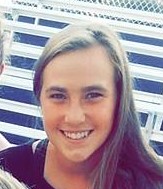 Lindsay Holsen (Research Translation Core and Community Engagement Core; Meyer Lab)
Lindsay Holsen (Research Translation Core and Community Engagement Core; Meyer Lab)
The Community Engagement Core and Research Translation Core welcomed a summer intern from Lawrence University in Appleton, Wisconsin, this summer. Lindsay is rising senior majoring in biochemistry with a minor in Spanish. Lindsay was a regular contributor to the Duke Superfund Center blog and provided research translation and community engagement support to researchers and trainees. She also worked with trainee Tess Leuthner as a lab assistant in the Meyer lab.
Summer 2016 Interns
 Katelyn Liu (Research Translation Core)
Katelyn Liu (Research Translation Core)
Katelyn Liu is a rising senior in public policy at the University of North Carolina at Chapel Hill. During her time at the Duke Superfund, she has been working in the Research Translation Core researching the fish consumption advisories’ of the Elizabeth River angler community. Her interests collect in the niche area of food policy research and she hopes to work in the non-profit sector for an organization that serves to engage communities in sustainable behavioral changes that improve public health.
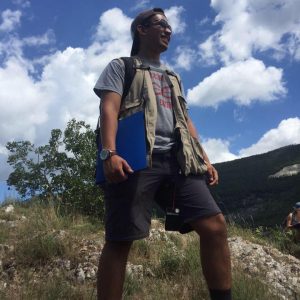 Andy Geleske (Community Engagement Core)
Andy Geleske (Community Engagement Core)
Andy is a rising senior at Lawrence University in Appleton, WI, a liberal arts college, where he is pursuing a dual major in environmental studies and geology. Andy is motivated and passionate about improving the quality of community gardens, and educating people about the health impacts of soil and pesticide contaminants. This summer, he is working on a literature review of soil contaminants in community gardens and pesticide use at those gardens. He is also focusing on providing resources to communities to help them better understand their potential for exposures.
Mattie is a rising senior at UNC-Chapel Hill who is pursuing a BSPH in environmental health sciences. Mattie is interested in how ecologically-relevant combinations of stressors interact in the environment to affect natural species. This summer, with members of the DiGuilio lab, Mattie is investigating how temperature stress in combination with PAH exposure affects the early development of zebrafish, and how these effects are manifested later in life. Read Mattie’s REU blog post here.
Tanner Waters (Project 3)
Tanner Waters is a rising junior double majoring in Environmental Science and Earth and Ocean Science at Duke University. During the Superfund internship, Tanner has been investigating arsenic induced mitochondrial toxicity in C. elegans through looking at bioenergetics. After the superfund, Tanner will continue his research in the Meyer Lab for his last two years at Duke.
Josh Wilkinson (Project 4)
Josh Wilkinson is a rising senior at North Greenville University in Greenville, SC, where he is pursuing a degree in Biology with an environmental focus. This summer, he is working under project 4 in Dr. Wiesner’s lab where he is studying fate and transport of nanoparticles through the environment, and how that may play a role in risk assessment. This internship appealed to Josh because he has a strong interest in applying remediation techniques to help others and clean up the environment.
Sonum Tharwani is a rising junior at Emory University who is majoring in Neuroscience and Behavioral Biology. She is particularly interested in investigating the neurological effects of toxicants. Hence, this summer she is working with zebrafish in the Levin lab to investigate the effects of various flame retardants on larval and adult behavior. In particular, Sonum is working to better develop and conduct a behavioral test battery that measures changes in social behavior, emotional function, and cognition in the zebrafish over time.
Summer 2015 Interns
Deanna Badger (Project 2, Stapleton Lab)
Alison Brooks (RTC)
John Chavez (RTC)
Audrey Dinyari (Project 3, Meyer Lab)
Billy Gerhard (Project 4, Gunsch Lab)
Austin Martini (NBTA)
Erica Ortiz (NBTA)
Amanda Riley (Project 3, Hinton Lab)
Summer 2014 Interns
Hunter Bradshaw (Project 4)
Roy Brooks-Rivera (NBTA)
Sasha Burwell (Project 3)
Nishika Karbhari (NBTA)
Jasmine Thompson (Project 3)
Alexandra Valladares (RTC)


